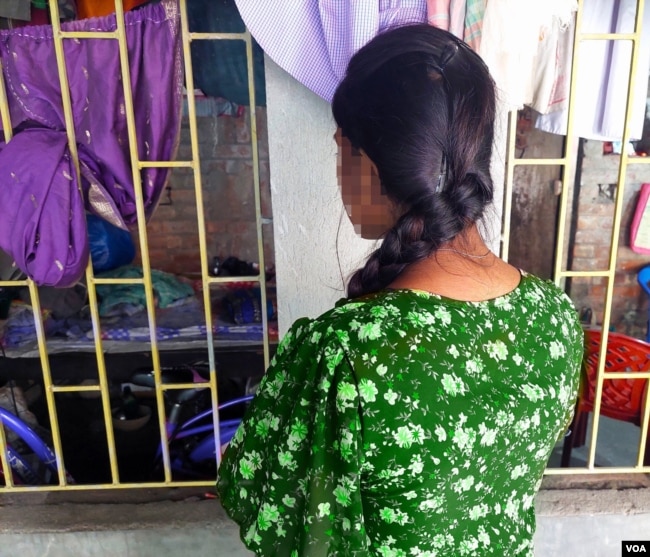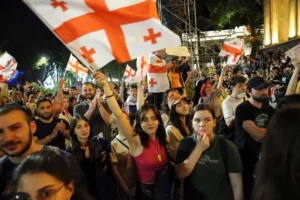It was a rainy August evening in a remote village of the West Bengal state in India when a WhatsApp message from an anonymous number appeared on 16-year-old Prodeepa’s smartphone screen. Her name and those of her family members have been changed to ensure anonymity.
“I saw his profile photo and found him really handsome. We began talking, and I immediately fell for him,” the high school student from the East Midnapore district told VOA.
Three weeks later, the boy asked Prodeepa to come with him to visit his hospitalized mother in a city about an hour away.
Prodeepa told her mother that she was going to a shop in the village.
“We thought she would be back in a few minutes,” said Bidisha, her mother. “But Prodeepa did not return, and the next day I received a call from an unknown number.”
The voice on the other end, which Bidisha did not recognize, said, “Mother, I am fine. I got married.”
Gone without a trace
The fifth National Family Health Survey report says that almost half the girls in India’s rural West Bengal state get married before they turn 18.
According to Jibananda Das, chairperson of the East Midnapore Child Welfare Committee, or CWC, social media is the greatest breeding ground for traffickers who are looking for child brides.
“It is especially difficult for us as government authorities to trace child marriage victims, because the majority of these marriages are unregistered. Most such girls are therefore merely reported as kidnapped or missing,” he told VOA.
‘Dyed hair and Coca-Cola’
With her husband unemployed, Bidisha, the sole earning member of the family, earns about $26 a month by making cigars.
“All I wanted for my daughter and son were lives marginally better than my own. Now I feel like all my dreams have shattered,” she said.

New Delhi-based anti-trafficking activist Pallabi Ghosh said that underage girls from West Bengal are especially vulnerable to being trafficked and married off because of the extreme poverty and deep-rooted culture of “sheltering” children in the state.
“The oldest daughter of a poor Bengali family, despite being a child herself, is forced to be the primary caregiver of all her younger siblings,” she said.
“Deprived of the attention and love of parents who are out working all day to make ends meet, many girls look for love elsewhere — usually on their phones,” the founder and director of the Impact and Dialogue Foundation, a nongovernmental organization that works to prevent human trafficking and rehabilitate survivors, told VOA.
“I handled the trafficking case of a rural girl who met a boy online and was enamored because he had dyed hair and bought her a cold drink. These girls’ exposure to the outside world is so limited that they end up trusting strangers at the tip of a hat,” Ghosh said.
No money, no justice
According to a copy of the First Information Report, or FIR, filed by Prodeepa’s family three days after she disappeared, the family looked all over the village several times before finally reporting her missing.
Manoj Kumar Sharma, head of an anti-human trafficking unit under the border security forces in east India, told VOA that economically challenged families in India are often afraid of even filing an FIR when their girls go missing.
“As national police forces, we take upon several complicated trafficking and child marriage cases, which the local police do not,” Sharma said. “It is not that they do not have the power or resources; they lack the enthusiasm and will, which is something that must be cultivated.”
VOA reached out to three police officials in East Midnapore district, including the sub-inspector who oversaw Prodeepa’s FIR proceedings. All of them refused to comment.
Sitting in a dingy bedroom with copies of the FIR and other legal documents regarding her case sprawled across the bed, Prodeepa said softly, “I share everything with my mother, but I did not tell her about the boy. That was my greatest mistake.”
The boy, who came to pick up Prodeepa on a motorcycle, refused to take off his helmet with a face shield.
“We rode for a distance before I realized we were headed in the wrong direction,” she said. “I asked him what was going on, but he brushed it off.”
The “boy” was, in fact, a 26-year-old man. He looked nothing like the WhatsApp photo.
Prodeepa was sexually abused, coerced into marriage and held against her will by the man and his family for a week.

Madhab, Bidisha’s older brother, said that the family delayed reporting Prodeepa as missing because they were afraid of rumors.
“People in villages talk. We had to wait until we were sure that she hadn’t married him voluntarily,” he said.
‘She said I was a bad girl’
For Prodeepa and her family, there is little hope for justice any time soon.
The perpetrator, who comes from a well-off family, was never arrested.
Prodeepa was promised legal aid by a nongovernmental organization, but it later backed out.
The CWC’s Das told VOA that all the rehabilitation centers for child survivors of sexual abuse in East Midnapore, like the one where Prodeepa was kept for a month after her rescue, are NGO-operated.
While at the CWC-approved center, Prodeepa’s family was allowed to visit for only 15 minutes at a time.
As someone with no formal education like most rural women in India, Bidisha had no knowledge of the official procedure and said that no authority took the time to explain it to her.
“A one-way trip to the center would cost me a week’s worth of income,” she said. “I often wondered why my daughter was being detained away from me like a criminal. Shouldn’t it have been that man who abused her?”
Her eyes brimming with tears, she asked a final question: “It’s like we are invisible to everyone. Is it because we are poor?”
Leafing through the pencil illustrations she made while at the rehabilitation center, Prodeepa said that one of the officials at the institution said she was responsible for her own abuse.
“She said I was a bad girl,” Prodeepa said. “But I never believed her. This is not my punishment to bear, but that of the criminal who wronged me.”
Source : VOA News
















